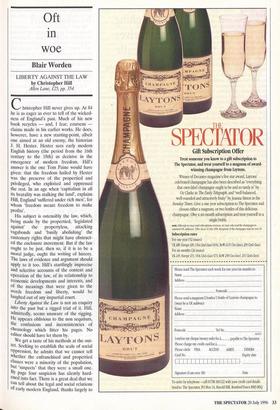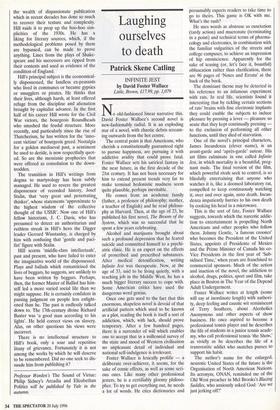Oft in woe
Blair Worden
LIBERTY AGAINST THE LAW by Christopher Hill Allen Lane, f25, pp. 354 Christopher Hill never gives up. At 84 he is as eager as ever to tell of the wicked- ness of England's past. Much of his new book recycles — and, I fear, coarsens claims made in his earlier works. He does, however, have a new starting-point, albeit one aimed at an old enemy, the historian J. H. Hexter. Hexter sees early modern English history (the period from the 16th century to the 18th) as decisive in the emergence of modern freedom. Hill's answer is the one Tom Paine would have given: that the freedom hailed by Hexter was the preserve of the propertied and privileged, who exploited and oppressed the rest. In an age when 'capitalism in all its brutality was stalking the land', explains Hill, England 'suffered under rich men', for whom 'freedom meant freedom to make profits'.
His subject is ostensibly the law, which, being made by the propertied, 'legislated against' the propertyless, attacking vagabonds and 'busily abolishing' the customary rights that might have obstruct- ed the enclosure movement. But if the law Ought to be just, then so, if it is to be a moral judge, ought the writing of history. The laws of evidence and argument should apply to it too. Hill's startlingly imprecise and selective accounts of the content and operation of the law, of its relationship to economic developments and interests, and of the meanings that were given to the words freedom and liberty, would be laughed out of any impartial court. Liberty Against the Law is not an enquiry into the past but a rigged trial of it. Hill, admittedly, seems unaware of the rigging. He appears oblivious to the non sequiturs, the confusions and inconsistencies of chronology which litter his pages. No editor should have let them by. We get a taste of his methods at the out- set. Seeking to establish the scale of social oppression, he admits that we cannot tell whether the enfranchised and propertied classes were a minority of the population, but 'suspects' that they were a small one. BY page four suspicion has silently hard- ened into fact. There is a great deal that we can tell about the legal and social relations of early modern England, thanks largely to the wealth of dispassionate publication which in recent decades has done so much to recover their texture and complexity. Hill raids it to prop up the boo-hoo sim- plicities of the 1930s. He has a liking for literary sources, which, if the methodological problems posed by them are bypassed, can be made to prove anything. Lines from the plays of Shake- speare and his successors are ripped from their contexts and used as evidence of the condition of England.
Hill's principal subject is the economical- ly dispossessed, the landless ex-peasants who lived in communes or became gypsies or smugglers or pirates. He thinks that their lives, although harsh, at least offered refuge from the discipline and alienation brought by capitalist advance. In the first half of his career Hill wrote for the Civil War victors, the bourgeois Roundheads who smashed the feudal structure. More recently, and particularly since the rise of Thatcherism, he has written for the 'inno- cent victims' of bourgeois greed. Nostalgia for a golden mediaeval past, a -sentiment he used to deride, is now respectfully quot- ed. So are the messianic prophecies that were offered as consolation to the down- trodden.
The transition in Hill's writings from dogma to martyrology has been subtly managed. He used to revere the greatest dispossessor of recorded history, Josef Stalin, that 'very great and penetrating, thinker', whose statements 'approximate to the highest wisdom of the collective thought of the USSR'. Now one of Hill's fellow historians, J. C. Davis, who has presumed to detect an authoritarian and ruthless streak in Hill's hero the Digger leader Gerrard Winstanley, is charged by him with confusing that 'gentle and paci- fist' figure with Stalin.
Hill scorns 'middle-class intellectuals', past and present, who have failed to enter the imaginative world of the dispossessed. Plays and ballads which romanticised the lives of beggars, he suggests, are unlikely to have been written by beggars. Perhaps, then, the former Master of Balliol has him- self led a more varied social life than we might suppose. He is certainly confident in passing judgment on people less enlight- ened than he. The past is endlessly talked down to. The 17th-century divine Richard Baxter was 'a good man according to his lights'. He held correct views on slavery. Alas, on other questions his views were incorrect.
There is no intellectual structure to Hill's book, only a sour and repetitive litany of grievance. Fortunately it is not among the works by which he will deserve to be remembered. Did no one seek to dis- suade him from publishing it?
Professor Worden's The Sound of Virtue: Philip Sidney's Arcadia and Elizabethan Politics will be published by Yale in the autumn.



























































 Previous page
Previous page